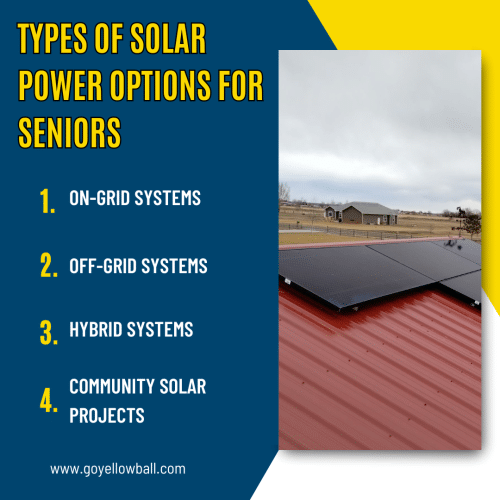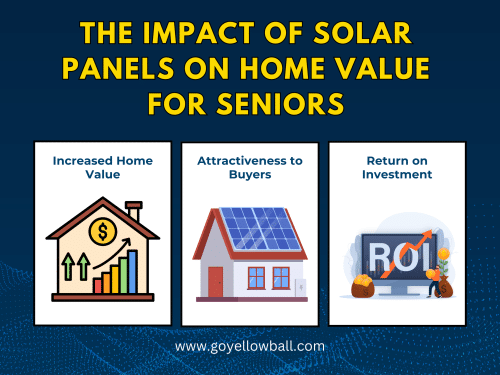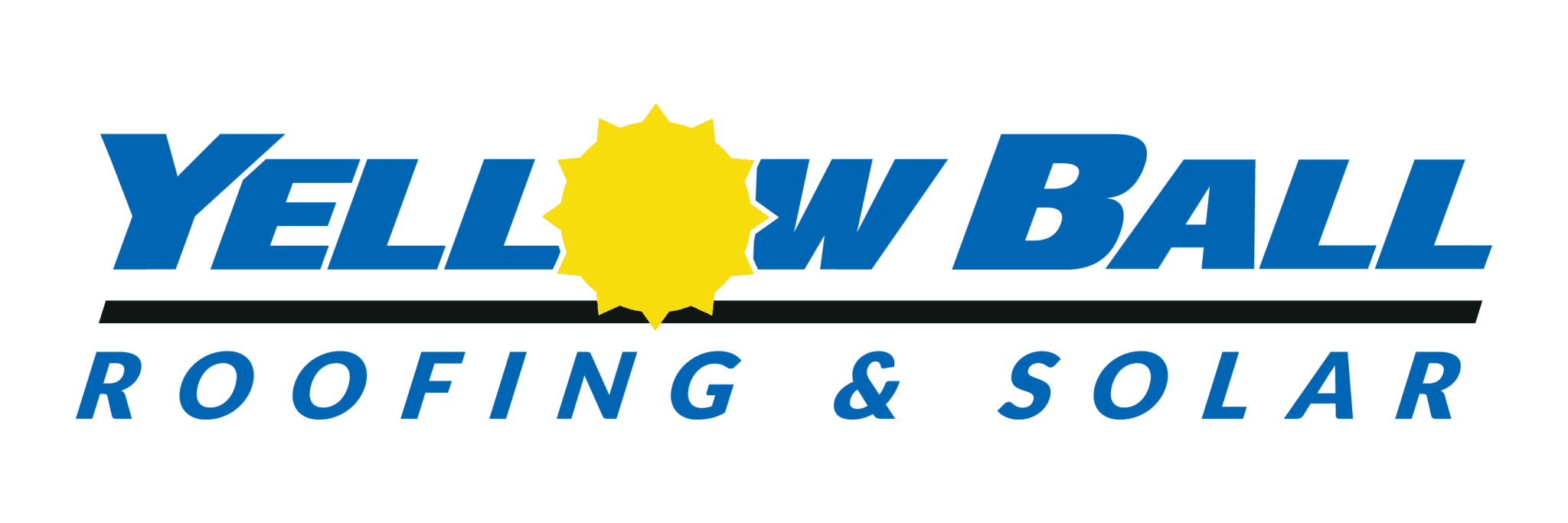Transitioning to solar panels for seniors is not just about adopting clean energy; it’s a savvy financial move.
In this guide, we’ll explore ways to reduce electric bills, highlight tax deductions and benefits that make solar adoption easier, and examine solutions for solar panels designed specifically for seniors.
Whether you reduce utility costs with rooftop installations or not, we’ve got you covered. Additionally, discover how solar installation can enhance your property’s worth and explore diverse funding strategies to efficiently tackle initial expenses.
Ready to make your home a model of sustainability and efficiency? Contact YellowBall Roofing & Solar today and take the first step towards a greener, more cost-effective future.
Table Of Contents:
- Understanding Solar Panels for Seniors
- Reducing Electricity Bills with Solar Energy Systems
- Types of Solar Power Options for Seniors
- Overcoming Installation Costs with Solar Incentives
- The Impact of Solar Panels on Home Value for Seniors
- Future Trends in Solar Energy for Seniors
- Comparing Solar Financing Options for Seniors
- FAQs about Solar Panels for Seniors
- Embracing the Future: The Bright Benefits of Solar Energy for Seniors
Understanding Solar Panels for Seniors
As homeowners in Montana and Wyoming increasingly focus on sustainable living, solar energy systems have emerged as a viable solution to reduce electricity bills and minimize carbon footprints.
Investing in solar panels can be particularly beneficial for seniors, who often seek ways to stretch retirement savings further.
Yellowball Roofing & Solar is dedicated to helping senior homeowners navigate the transition to solar power with ease and confidence.
The Benefits of Going Solar for Seniors
Solar investment offers numerous advantages that are specifically appealing to the senior demographic. First, it provides an opportunity to significantly save on utility bills—a crucial consideration for those on fixed incomes.
Additionally, solar energy is clean and renewable, aligning with the environmentally conscious values many seniors hold dear. With technological advancements making solar systems more efficient, now is an opportune time for seniors to consider this investment.
- Reduced Energy Bills: Enjoy lower monthly costs by harnessing free sunlight.
- Eco-Friendly Living: Contribute positively toward reducing greenhouse gas emissions.
- Tax Incentives: Benefit from federal tax credits designed to encourage the adoption of solar power.
Selecting the Right Solar Panel System
Finding the perfect fit when choosing a solar panel system doesn’t have to be daunting. At Yellowball Roofing & Solar, we pride ourselves on providing tailored advice based on your specific needs and home characteristics.
We consider factors such as roof size and sun exposure levels throughout different seasons in Montana and Wyoming landscapes, ensuring optimal installation efficiency year-round.
To ensure you’re getting top-notch service coupled with high-quality products at competitive prices—we recommend starting your journey by requesting a comprehensive evaluation from our team.
This assessment will give you insight into potential cost savings while illustrating how seamlessly our solutions integrate into your lifestyle without compromising comfort or convenience.
Reducing Electricity Bills with Solar Energy Systems
The Cost of Electricity for Seniors
Electricity bills can consume a large portion of a fixed income, making energy costs a concern for many seniors.
With prices fluctuating and generally trending upwards, finding a reliable way to reduce these bills is crucial. Seniors, who often have more time at home, can be particularly affected by seasonal peaks in energy costs.
The need for affordable energy solutions is more pressing than ever, as energy costs can be unpredictable and significantly impact a senior’s budget. Solar energy presents a stable and reliable solution to mitigate these financial pressures.
How Solar Energy Reduces Bills
Solar panels convert sunlight into electricity, directly reducing the amount of energy you need to buy from your utility provider. Over time, these savings can significantly surpass the initial cost of installation.
This conversion process, known as photovoltaic technology, allows for a clean and sustainable energy source, virtually eliminating the electric bill in some cases.
As sunlight is free and abundant, seniors can enjoy the financial benefits of solar power after overcoming the initial setup costs. Solar energy systems are known for their long lifespans and low maintenance, making them ideal for seniors looking for long-term savings.
Types of Solar Power Options for Seniors
On-Grid Systems
These on-grid systems are connected to the public electricity grid and are ideal for ensuring a continuous power supply. Excess electricity generated can often be sold back to the grid, which is called net metering, earning credits on future bills.
This interconnectivity ensures reliability, as it provides a backup power source when solar production is low. Additionally, on-grid systems can be less expensive than off-grid systems, as they do not require battery storage.
This setup is particularly beneficial for seniors seeking a balance between sustainability and security.
 Off-Grid Systems
Off-Grid Systems
For seniors living in remote areas, off-grid systems provide independence from utility companies. However, they require a significant initial investment and a way to store energy for night use.
These systems are entirely self-sufficient, making them ideal for locations without reliable grid access. Although the upfront cost and maintenance of batteries can be higher, the long-term benefits of complete energy independence can outweigh these costs.
Off-grid systems offer a sense of security and autonomy, which is valuable for seniors who value self-reliance and preparedness.
Hybrid Systems
Hybrid systems combine solar panels with battery storage or another backup system, offering the best of both worlds but at a higher cost.
These systems provide the reliability of on-grid systems with the independence of off-grid systems, allowing homeowners to store excess energy for use when solar production is insufficient.
Hybrid systems can also protect against power outages, ensuring critical appliances remain operational. For seniors, this means peace of mind, knowing that their energy needs will be met, regardless of external conditions.
Community Solar Projects
These projects allow individuals to benefit from solar energy without installing their own panels, perfect for those in apartments or with unsuitable rooftop solar.
Community solar offers a unique opportunity for seniors to participate in renewable energy without needing physical space or maintenance.
By subscribing to a community solar project, seniors can receive credits on their electricity bills proportional to their share of the solar energy produced.
This model democratizes access to solar energy, ensuring that more seniors can enjoy clean, affordable power.
Overcoming Installation Costs with Solar Incentives
Initial Costs of Solar Panels
While the cost of solar panels has decreased significantly, the initial price tag can still be daunting. However, various incentives can help.
The price decline over the past decade has made solar energy more accessible than ever, yet some people remain hesitant about the initial investment.
Thankfully, a range of financial incentives, including solar investment tax credits, rebates, and grants, are available to reduce these upfront costs. These incentives are crucial for seniors on fixed incomes, making solar panels an achievable investment.
Federal and State Incentives
The federal solar tax credit allows you to deduct 30% of the cost of installing a solar energy system from your federal taxes.
Many states offer additional incentives, such as rebates and tax breaks. These incentives can significantly lower the net cost of solar panel installation, making solar energy an attractive option for seniors.
Beyond immediate financial savings, these incentives reflect broader governmental support for renewable energy adoption among all age groups, including seniors.
Therefore, seniors must research and take advantage of these programs to maximize their savings.
Local Incentives and Programs
Some local governments and utility companies in Billings, Montana offer programs that reduce costs or make solar panels more accessible through financing plans.
These local initiatives can be particularly beneficial, as they often address the specific needs and challenges of the community’s seniors.
Whether it’s a rebate program in Billings that lowers installation costs or a financing plan that spreads out payments, local incentives can significantly make solar energy feasible for more seniors.
Engaging with local energy advisors or senior centers can provide valuable information on these opportunities.
The Impact of Solar Panels on Home Value for Seniors
Increased Home Value
Homes with solar panels often sell for more. A study by Zillow found that homes with solar panels sell for approximately 4% higher than similar homes without solar.
This increase in home value can be a significant benefit for seniors, especially those considering downsizing or leaving a legacy for their families.
The added value reflects the energy savings and the growing demand for sustainable and energy-efficient homes. For seniors, this means that the investment in solar panels can yield financial benefits beyond just the savings on electricity bills.
 Attractiveness to Buyers
Attractiveness to Buyers
Eco-conscious buyers and those looking to save on electricity costs may be more drawn to homes already equipped with solar panels, potentially making these homes quicker to sell.
The appeal of solar-equipped homes is growing as more people become aware of the environmental and financial benefits of solar renewable energy. For seniors looking to sell their homes, having solar panels can be a key selling point that differentiates their property in a competitive market.
This attractiveness to a broader pool of buyers can also lead to a faster sale, reducing the stress and uncertainty that can come with selling a home.
Return on Investment
Reducing electricity bills, potential income from selling back excess power, and increased home value can make solar energy a wise investment.
The return on investment (ROI) from solar panels can significantly enhance seniors’ financial security. The long-term savings on energy costs and the potential increase in property value offset the upfront installation costs.
Moreover, seniors can invest in both their financial and environmental future potential by using solar energy, which leaves a greater environmental legacy.
Solar panels are a wise financial choice for seniors considering their long-term wants and objectives due to their diverse return on investment.
Future Trends in Solar Energy for Seniors
Technological Advancements
Emerging technologies promise even more efficient solar panels, potentially lowering costs and increasing solar’s appeal for seniors.
Advances in photovoltaic materials and manufacturing processes continue to improve solar panels’ efficiency and durability, making them a more compelling option for energy generation.
For seniors, this means access to cutting-edge technology that can provide greater energy independence and savings. Staying informed about these advancements can help seniors decide when and how to invest in solar energy.
Policy Changes
As renewable energy becomes a more significant part of national energy policies, new incentives, and support programs could emerge, making solar energy even more accessible.
These policy shifts can directly impact the affordability and attractiveness of solar installations for seniors. By advocating for and supporting renewable energy policies, seniors can play a role in shaping the future of energy in their communities.
Seniors can also make sure they are prepared to take advantage of new incentives as they become available by staying up to date on policy developments.
Community and Social Impacts
Widespread adoption of solar energy for seniors can lead to substantial community and environmental benefits, promoting sustainability for future generations.
As more seniors turn to solar power, they not only reduce their own energy costs but also contribute to the reduction of greenhouse gas emissions and the demand for fossil fuels. This collective action can have a significant impact on local and global environments, paving the way for a cleaner, more sustainable future.
Moreover, community solar projects and group purchasing programs can strengthen social ties among seniors, fostering a sense of camaraderie and shared purpose in the pursuit of renewable energy solutions.
Comparing Solar Financing Options for Seniors
Solar Power Agreement, Solar Leases, Fixed Incomes
Seniors on fixed incomes seeking to harness solar energy often face a common hurdle: the upfront costs. Yet, options like solar power purchase agreements (PPAs) and solar loans and leases present pathways that can make this transition financially manageable.
In a PPA, seniors can enjoy the benefits of solar panels without owning them outright. The company installs panels at no initial cost.
It benefits people concerned about large power bills or unpredictable rate hikes because it costs a set monthly fee depending on electricity usage.
Solar leases operate similarly but may offer even more flexibility regarding maintenance responsibilities. With leases, seniors can save money without worrying about system maintenance, which usually includes renting equipment for a monthly charge.
At the same time, PPAs focus on selling back generated electricity at a predetermined cost.
Loans vs. Leases
Deciding on the best financial path means balancing the pros and cons of borrowing versus leasing. Loans eventually let you own your system outright—meaning any tax credits or incentives go directly into your pocket.
Direct ownership through loans might be appealing because it allows one to fully take advantage of federal investment tax credits available for renewable energy installations.
Conversely, opting for a lease means you can dodge the initial payment and enjoy steady costs without fretting over maintenance or how well things are running—something that’s especially valuable to older adults eager to streamline their financial matters.
FAQs about Solar Panels for Seniors
Are solar panels worth it for seniors?
Absolutely. Seniors can slash their electric bills, enjoy tax breaks, and even boost their home’s value.
Can you get free solar panels in Montana?
Nope. But Montanans can tap into hefty incentives and rebates to dramatically cut costs.
How many solar panels does it take to power a house?
This varies, but an average U.S. home might need 17-20 panels based on usage and sunlight exposure.
Embracing the Future: The Bright Benefits of Solar Energy for Seniors
Switching to solar panels for seniors can greatly lower their expenses and increase the value of their homes, providing both immediate savings and long-term financial benefits. This move is all about reducing those high electricity bills and taking advantage of tax credits.
Switching to solar energy is not just about reducing monthly expenses. It’s also about securing a financially stable future with each new day.
Take advantage of available incentives; they are your key to overcoming the initial costs. Exploring funding options reveals many paths, ensuring there’s a solution for every budget.
While the idea of adopting solar energy may seem overwhelming at first, remember that each solar panel does more than just harness sunlight—it captures savings, offers peace of mind, and represents a part of the future.
Embrace a future where your home is not just a living space but a proof of sustainability. Contact YellowBall Roofing & Solar for innovative solutions to make your home more energy-efficient.




